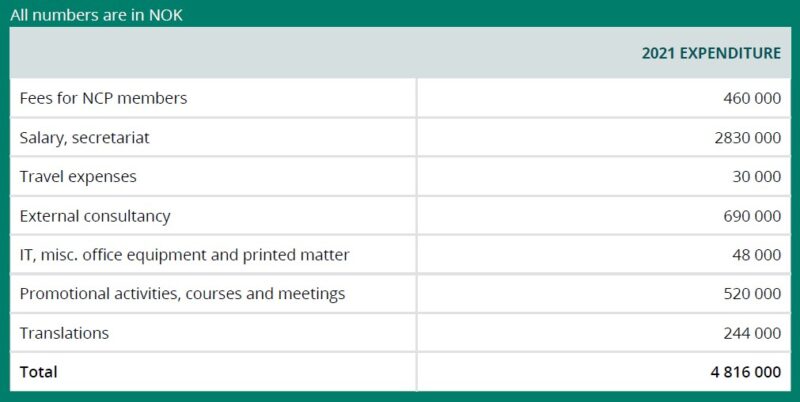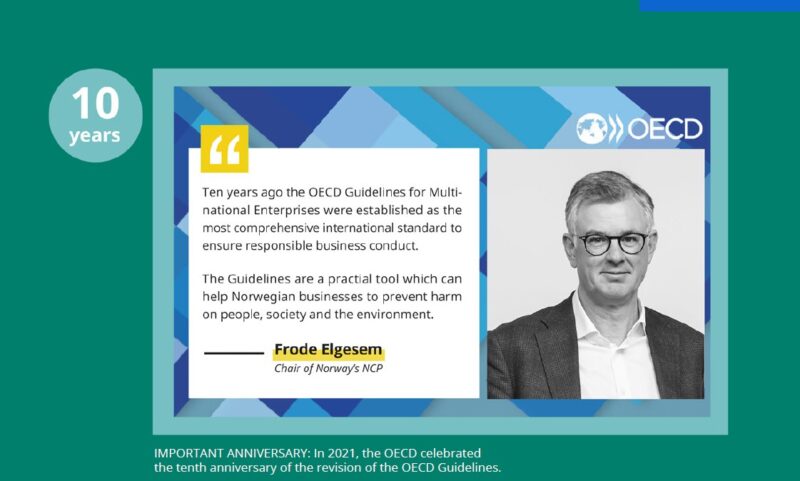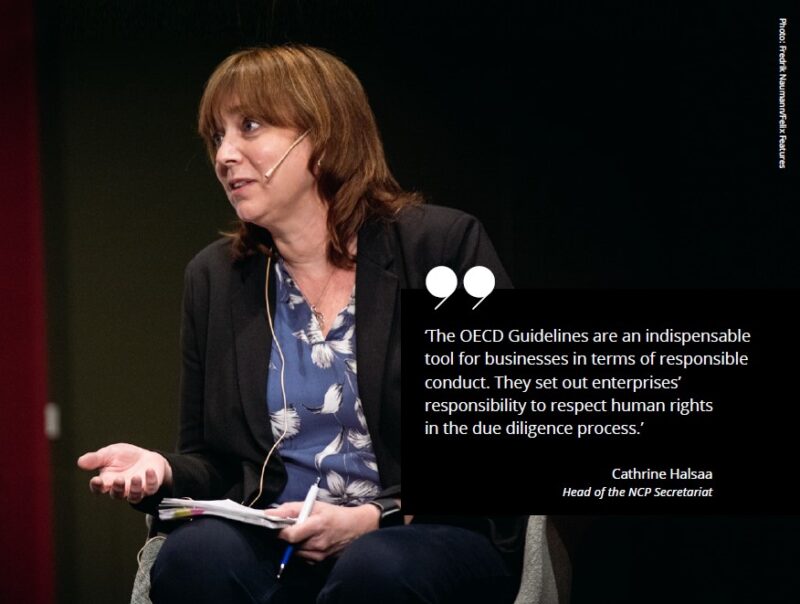Annual Report 2021
Annual Report 2021
The OECD Guidelines for Multinational Enterprises
The new Transparency Act has made Norway’s National Contact Point for Responsible Business Conduct more relevant than ever.
The National Contact Point (NCP) is an impartial and independent expert body, appointed by the Norwegian authorities. The NCP is tasked with supporting the government in their work to promoting the OECD Guidelines for Responsible Business Conduct, handling complaints against companies and contributing to a well-functioning national contact point system by working closely with the National Contact Points of other countries and the OECD Secretariat. These are extensive, important and meaningful tasks.
The OECD Guidelines are the most comprehensive set of recommendations addressed by governments on responsible business conduct. They reflect good practice for all enterprises – not just multinational enterprises. Complying with the OECD Guidelines will enable businesses to make substantial positive contributions to economic, environmental and social progress across the world. Promoting the Guidelines is thus not only an international commitment the Government has undertaken, but absolutely vital to steering business in a more sustainable direction.
In 2021 – in the midst of the pandemic – the work on fostering more responsible business conduct received a long-sought-after helping hand. The new Norwegian Transparency Act places a legal obligation on enterprises of a certain size to perform due diligence in accordance with the OECD Guidelines. The objective of the Act is to promote enterprises’ respect for fundamental human rights and decent working conditions – both in global supply chains and in enterprises here in Norway.
The NCP welcomes the new Act. We are convinced it will put the necessary pressure on Norwegian enterprises to familiarise themselves with the Guidelines’ expectations to carry out due diligence, and to make active efforts to implement them in their organisations. This is a welcome development! Firstly, because Norwegian enterprises also have supply chains where human rights and trade union rights are violated, and where the working conditions are unacceptable. Secondly, because many industries here in Norway also need to improve their practices. Thirdly, Norwegian enterprises clearly need to step up their responsible business conduct to keep up with the international competition.
We are already seeing the ‘spotlight effect’ of the Transparency Act, which increases the need for guidance on responsible business conduct. We look forward to a good, long-term collaboration with the Norwegian Consumer Authority, which is the supervisory and advisory body for the Act. The demand for guidance, courses and tools to assist enterprises in achieving full compliance with the Act increased in 2021. This demand is not about to wane.
‘We are already seeing the “spotlight effect” of the Transparency Act, which increases the need for guidance on responsible business conduct.’
The OECD Guidelines also cover a lot more than human rights and decent working conditions. They clarify expectations of business in other areas as well, such as disclosure, the environment, climate and anti-corruption. The guidance we provide will continue to cover these areas. The EU’s work on sustainability is also significant to the work we do. For example, the social safeguards of the EU taxonomy – or classification system – for sustainable economic activity make reference to the OECD Guidelines.
In 2021, the NCP has handled more complaints than ever. The complaints are often complex and require a high professional standard and efficient handling. The Secretariat has considerable experience and expertise in handling complaints, and our new Policy Director has also made a strong contribution in this area. We have also recruited highly-qualified mediators to facilitate the dialogue between the parties, among other things through an informal cooperation with the National Mediator of Norway. We expect more complaints to be submitted in the years to come.
The OECD Guidelines and Commentaries were last updated in 2011, and updates are now needed to ensure that they address today’s challenges and possibilities in terms of the contribution businesses can make to economic, environmental and social progress. This concerns topics such as the climate and digitalisation. More must also be done to strengthen individual countries’ National Contact Points, to enable them to work in a more uniform manner. There is too much difference between the National Contact Points at present. The OECD is under way with this work. Norway’s NCP also provides support to the Norwegian authorities in connection with this important process, and will continue to do so.
The NCP looks forward to 2022 being an exciting year.
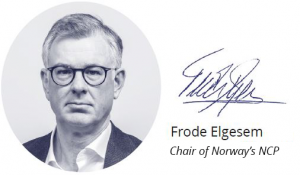
The OECD Guidelines for Multinational Enterprises are the most extensive and best established of all international mechanisms promoting responsible business conduct.
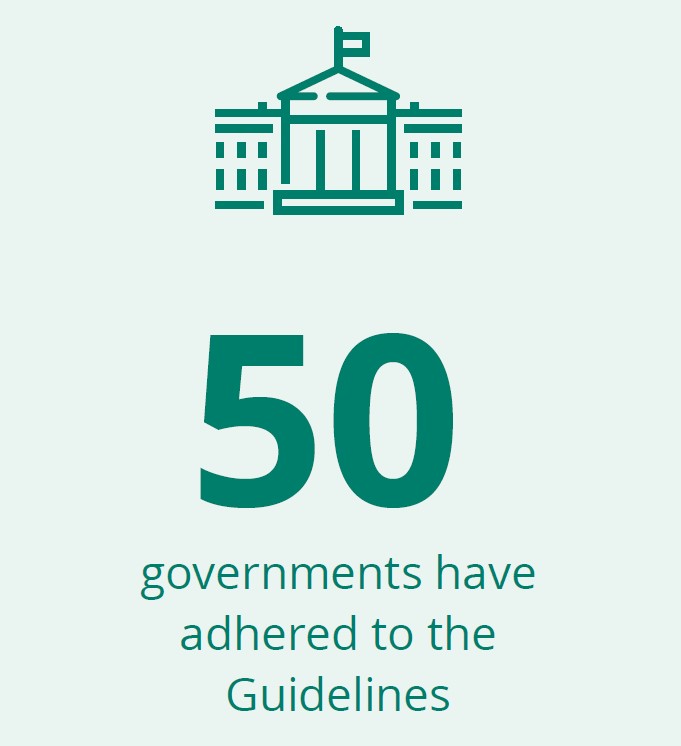
Sustainable development
A main goal of the OECD Guidelines is that the business sector should contribute to sustainable development.
A company that is not aware of its responsibilities can, at worst, contribute to violations of human rights and trade union rights, environmental destruction, corruption or a negative impact on local communities.
The Guidelines and due diligence help businesses to prevent adverse impacts and harm to people, society or the environment, and to remedy any harm caused, thus helping to achieve the UN Sustainable Development Goals.
A clear expectation
The Guidelines are the OECD countries’ recommendations for the business sector, and there is a clear expectation on the part of the governments that they are implemented.
Cover all areas
Seen as a whole, the OECD Guidelines cover all the important areas that a responsible business needs to address. According to the Guidelines, businesses must:









A core element of the OECD Guidelines is that companies are expected to carry out due diligence to avoid causing harm to people, society and the environment.
Businesses should map, prevent and address adverse impacts that may be associated with their operations, supply chain and business relationships, and communicate what measures they have in place to address these impacts. In short, they need to understand the risks they are associated with, address them and provide information about what they do.
The due diligence model
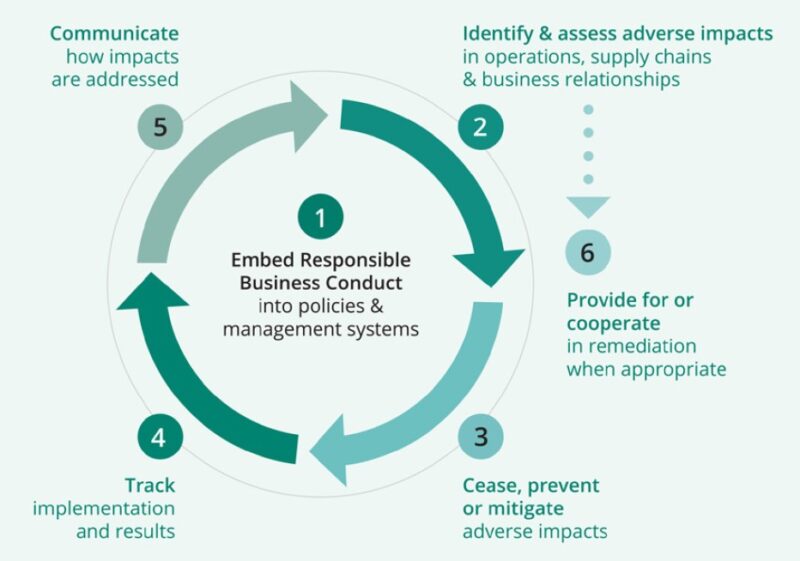
The OECD Guidelines for Multinational Enterprises are supported by a unique mechanism: the National Contact Points (NCPs).
The governments of all countries that adhere to the OECD Guidelines are obliged to establish an NCP.
They are tasked with promoting the OECD Guidelines for Multinational Enterprises and handling complaints. Fifty countries have so far established NCPs. The way in which the NCPs are organised varies from country to country.
UNIQUE MECHANISM
The NCP system is the only recognised non-judicial grievance mechanism for responsible business conduct.
The NCPs can handle complaints concerning companies operating in or from their territory.
_____________________________________________________________________________________________
AREAS
Since 2011, most complaints have concerned the following areas:
- Human rights (50%)
- General policies (49%)
- Employment and industrial relations (labour rights) (37%)
_____________________________________________________________________________________________

COMPLAINANTS
Since 2011, most complaints have been submitted by:
- Civil society organisations (38%)
- Civil society organisations (38%)
- Civil society organisations (38%)
_____________________________________________________________________________________________

RESULTS
Since 2011, 36% of complaints handled by the NCPs have led to an agreement, while 33% of the complaints have led to a change in the company policy.
_____________________________________________________________________________________________
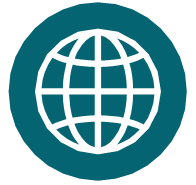
GLOBAL COVERAGE
The 50 countries adhering to the Guidelines account for over 70% of foreign direct investments, which highlights the global reach of the National Contact Points.
Since 2000, the NCPs have handled more than 500 specific instances, related to business activities in more than 100 countries.
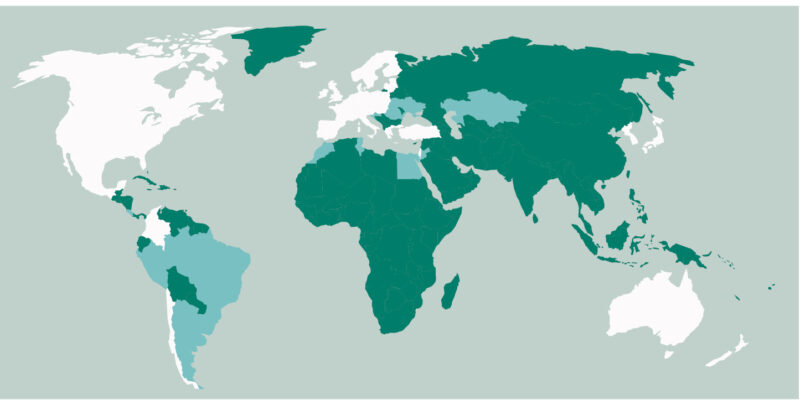
OECD countries with National Contact Points
Australia, Austria, Belgium, Canada, Chile, Colombia, Czech Republic, Denmark, Estonia, Finland, France, Germany, Greece, Hungary, Iceland, Ireland, Israel, Italy, Japan, Latvia, Lithuania, Luxembourg, Mexico, The Netherlands, New Zealand, Norway, Poland, Portugal, Slovakia, Slovenia, South Korea, Spain, Sweden, Switzerland, Turkey, UK, USA
Adhering countries with National Contact Points
Argentina, Brazil, Costa Rica, Croatia, Egypt, Jordan, Kazakhstan, Morocco, Peru, Romania, Tunisia, Ukraine, Uruguay
 Observer countries
Observer countries
China, India, Russia
Norway’s National Contact Point for Responsible Business Conduct is an independent, public expert body comprising four members.
The NCP is chaired by Court of Appeal Judge Frode Elgesem. The Members of the NCP are appointed by the Ministry of Foreign Affairs and the Ministry of Trade, Industry and Fisheries, in cooperation with the Ministry of Labour and Social Inclusion, and the Ministry of Finance. They are appointed on the basis of their professional expertise, and based on proposals from the social partners and civil society, represented by the Confederation of Norwegian Enterprise (NHO), the Confederation of Norwegian Trade Unions (LO) and the Forum for Development and Environment (ForUM).
The NCP has a secretariat, which in 2021 had three permanent full-time employees. The secretariat is under the administrative authority of the Ministry of Foreign Affairs, but has a separate budget and operates independently of the Government.
The secretariat and the members engage in extensive promotional activities and provide guidance to Norwegian businesses and other stakeholders on how they can meet the expectations in the OECD Guidelines. The secretariat also supports the handling of specific instances.
Members

Chair, judge at Borgarting Court of Appeal

Head of Product and Sustainability, Celsia

Special Adviser, LO

Political Adviser, Amnesty International
Handling of specific instances
__________________________________________________________________________________
Complaint handling
Department Director at the Norwegian Institute of Public Health, currently in charge of handling complaints as stand-in for the Chair of the NCP
Professor dr. juris at the University of Oslo, currently in charge of handling complaints as stand-in for the Chair of the NCP
__________________________________________________________________________________
The secretariat


Senior Adviser

The NCP’s budget mainly covers fees for the NCP members and salaries for the secretariat employees (three permanent employees). Other funds are spent on the handling of specific instances, promotional activities, and expert assistance.
